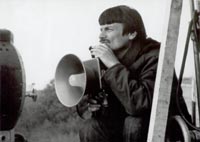Raised in the Russian Orthodox tradition, director Andrei Tarkovsky once told an interviewer, “I consider myself a person of faith, but I do not want to delve into the nuances and problems of my situation, for it is not so straightforward, not so simple, and not so unambiguous.”
The most revered Russian filmmaker since Sergei Eisenstein, Tarkovsky offers an unabashedly religious worldview, without which, he wrote, “people cease to feel any need for the beautiful or the spiritual, and consume films like bottles of Coca-Cola.”
In his famous book on directing, Sculpting in Time, Tarkovsky wrote, “Concerned for the interests of the many, nobody thought of his own in the sense preached by Christ: ‘Love your neighbor as yourself.’ That is, love yourself as much that you respect in yourself the supra-personal, divine principle, which forbids you to pursue your acquisitive, selfish interests and tells you to give yourself, without reasoning or talking about it, to love others.”
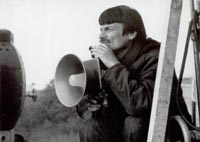
Tarkovsky’s diaries—published under the title Time Within Time, which he called, tongue only partially in cheek, Martyrology—are peppered with ruminations on God and film, with Scripture references and with desperate prayers for help (e.g. “Lord! I feel You drawing near, I can feel Your hand upon the back of my head. Because I want to see Your world as You made it, and Your people as You would have them be. I love You, Lord, and want nothing else from You.”).
One page has a drawing of a cross and Tarkovsky has written, “What can I do? Only pray! And believe. The most important thing of all is this symbol, which it is not given to us to understand, only to feel. To have faith in spite of everything; to have faith.”
He worked slowly and met with much resistance from the Soviet authorities, yet his half-dozen feature films, though difficult to interpret on any more than an intuitive, experiential level, are hypnotic: images from each burn indelibly into the viewer’s memory.
Opposed interpretation
Tarkovsky opposed any intellectual interpretation of his films. When asked what rain means in his films, he replied merely that it rains a lot in Russia. When pressed for the water symbolism in his films, he rebelled that water is merely cinematic, that there was no meaning beyond its existence on film.
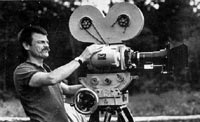
Nature, not seen as fallen in the Eastern church, but rather good at its core, possible even of bringing one to salvation, plays a major role in his films. Horses and dogs figure prominently, and the earthy elements of fire and water are omnipresent.
The influence of Russian religious history is also evident in his use of the Holy Fool, an archetype of Russian literature—often characters of deep faith, seen as fools by the world, yet who see God’s reality as it truly is.
All his films deal with apocalyptic scenarios; indeed, one film idea he had was titled “The End of the World,” yet he refused the label “pessimist.” Indeed, he said of apocalyptic literature, “It would be wrong to consider that the Book of Revelation only contains within itself a concept of punishment, of retribution; it seems to me that what it contains above all, is hope.”
Ivan’s Childhood, about a boy living in wartime, was his first feature film and was championed by no less than Jean Paul Sartre. One can see many of the above-mentioned features at least in embryonic form, but it was with his next film that Tarkovsky took a great leap into the pantheon of great filmmakers.
Andrei Rublev—originally titled The Passion According to Andrei—portrays the great Russian icon painter’s life during a period of enforced muteness wherein he did not paint for more than a decade. Rublev is never shown painting his icons, and the film, shot in black and white, bursts into color only at the very end as the icons attributed to Rublev are shown in loving detail via slow pans, tilts and zooms. The film was criticized for its violence and earthiness, although Tarkovsky surely found the modern world much more brutal in comparison.
The Soviet response to 2001?
On his next film, Solaris, Tarkovsky adapted the science fiction classic by Polish author Stanislaw Lem, who was furious with Tarkovsky’s changes which focused more on family and nature than on outer space and scientific knowledge. In addition, the relationship between Kris and Hari in the film, where love is the only saving grace, is practically the opposite of that in the book, where it is another hook upon which Lem hangs his philosophy.
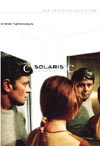
In an interview on the film, Tarkovsky said, “It seems to me that the conflict, and the fraught, urgent search for a spiritual ideal, will continue until humanity has freed itself sufficiently to concern itself only with the spiritual. As soon as that happens a new stage will begin in the development of the human soul, when man will be directed into his inner being as intensely, deeply, passionately, limitlessly, as he had directed his efforts up till now to his search for inner freedom.”
When screened at Cannes it was called the Soviet response to Kubrick’s 2001, yet the two films are, well, worlds apart. Tarkovsky found Kubrick’s world “cold and soulless” and intentionally made his film as different as he could, especially eschewing those obligatory science fiction shots of the space ships and gadgetry.
The film’s cult following is so strong even today that, when Steven Soderbergh announced a remake, he had to clarify that he was not remaking Tarkovsky’s Solaris, but Lem’s.
Mirror, perhaps Tarkovsky’s most autobiographical film, combines Russian history with personal reflection on Tarkovsky’s childhood, especially regarding the figure of his mother. “The purpose of Mirror,” Tarkovsky said in a talk, “is that of a homily: look, learn, use the life shown here as an example.”
He increased the ambiguity of his stories with this film, and started to require more of the audience. The film met with such resistance from Soviet authorities that Tarkovsky toyed with the idea of giving up directing altogether, but letters from fans kept him going. He quotes one that reads, “My childhood was like that … only how did you know about it?”
“I believe that it is always through spiritual crisis that healing occurs,” Tarkovsky wrote. “A spiritual crisis is an attempt to find oneself, to acquire new faith… . It seems to me that the individual today stands at a crossroad, faced with the choice of whether to pursue the existence of a blind consumer, subject to the implacable march of new technology and the endless multiplication of material goods, or to seek out a way that will lead to spiritual responsibility, a way that ultimately might mean not only his personal salvation but also the saving of society at large; in other words, to turn to God.”
Stalker represents the fruition of Tarkovsky’s stated desire to make a film following Aristotle’s concept of the dramatic unities, wherein the singular action of a play takes place in a specific place during the course of one day. The Stalker leads a Writer and a Professor into a place called The Zone where dreams and fantasies reportedly come true. The film includes a prayer by the main character for those he leads to find faith, and a dream sequence where a woman’s voice reads from Revelation 6 as we view the debris of a destroyed city. Tarkovsky once told an interviewer, “The Stalker needs to find people who believe in something in a world that no longer believes in anything.”
“The film,” Tarkovsky wrote in his diary, “is about the existence of God in man, and about the death of spirituality as a result of our possessing false knowledge.
Identifying with the suffering of others
In Nostalghia, Tarkovsky’s most ambiguous film, the main character Gorchakov walks through the ruins of a monastery as St. Catherine’s voice asks God why he doesn’t make himself known. God says that he does, but that Gorchakov simply doesn’t see him. This is the most dreamy of Tarkovsky’s films, and doubling occurs frequently.
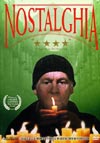
The director, who told an interviewer that this film is about “the nostalgia of spirituality,” defined nostalgia in a peculiarly Russian way: “It’s identifying oneself with the suffering of another man, in a passionate way.” In fact, the idea is so central to Tarkovsky’s work that the premiere website devoted to the director is at the domain nostalghia.com.
Tarkovsky told a press conference, “Nostalghia is about the impossibility of people living together without really knowing one another, and about the problems arising from the necessity of getting to know one another. It’s very simple to make acquaintances, much more difficult to arrive at a deeper knowledge of another person.”
After Nostalghia, Tarkovsky decided not to return to Russia. He directed much of his last film, The Sacrifice, from a hospital bed. A European co-production shot in Sweden by the legendary cinematographer Sven Nykvist (Bergman’s favorite), the credits roll over Leonardo’s Adoration of the Magi as Bach plays on the soundtrack. Alexander, the main character, has learned of the outbreak of a nuclear war. Although he has admitted that his relationship with God is non-existent, he prays to God that if he would only restore the world to the way it was before, he will sacrifice everything he owns, everyone he loves, and never speak again. “God hears Alexander’s prayer,” Tarkovsky says, “and the consequences are at once terrible and joyful.”
“When I was young,” he told an interviewer, “I asked my father, ‘Does God exist, yes or no?’ And he answered me brilliantly: ‘For the unbeliever, no, for the believer, yes!'”
At the end of The Sacrifice, a boy says to his own father, “In the beginning was the Word. Why is that, Papa?” The father does not answer as the camera tilts up a tree to the sky and a title appears, dedicating the film to Tarkovsky’s son.
The final sentences of Sculpting in Time are, characteristically, questions about God and art: “Perhaps the meaning of all human activity lies in artistic consciousness, in the pointless and selfless creative act? Perhaps our capacity to create is evidence that we ourselves were created in the image and likeness of God?”
Tarkovsky died in 1986, an untimely death by heart attack shortly after his son was allowed to leave the USSR, just as Gorbachev’s perestroika and glasnost were starting to take root in his homeland. To his death Tarkovsky considered himself a “Russian, not a Soviet” and, ironically, in 1990, he was posthumously awarded the Lenin Prize for his “outstanding contribution to the development of cinema art, for his innovative films, which help to affirm universal human values and humanistic ideas.”
Tarkovsky was buried in Paris, his epitaph stating simply, “To the man who saw the Angel.”
To learn more about Tarkovsky, click here, here, and here.
Filmmakers of Faith, an occasional feature at Christianity Today Movies, highlights directors who adhere to the Christian faith—sometimes strongly, sometimes loosely, and sometimes somewhere in between. This series will include everyone from biblically-minded evangelicals to directors who may only have a “church background” and perhaps a lapsed faith … but their films are clearly informed by their spiritual history.
© Eric David 2006, subject to licensing agreement with Christianity Today International. All rights reserved. Click for reprint information.

